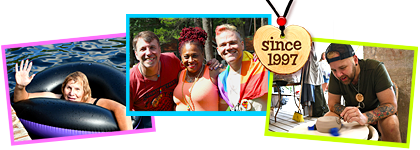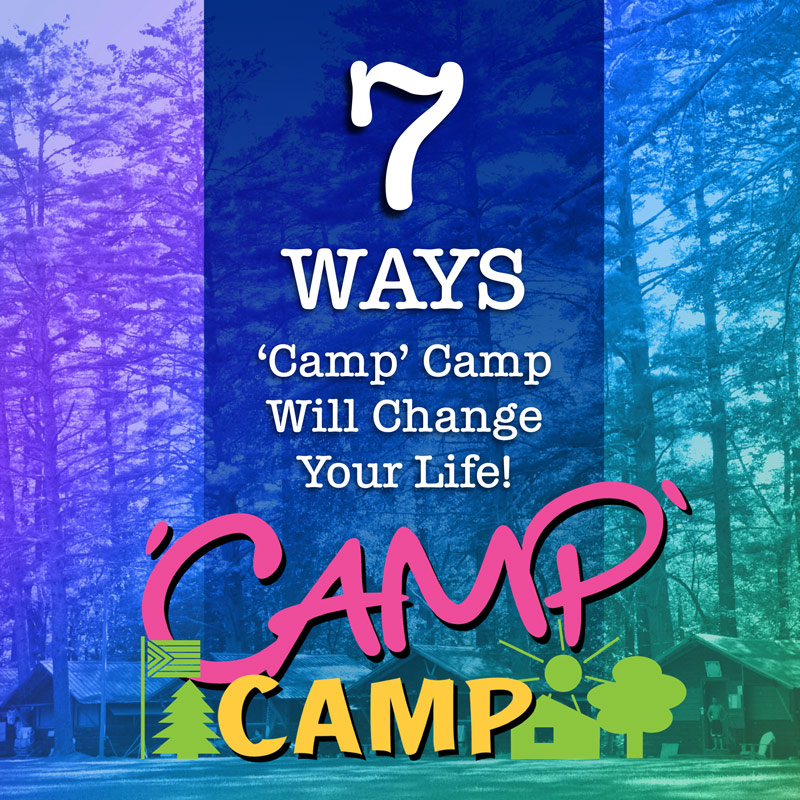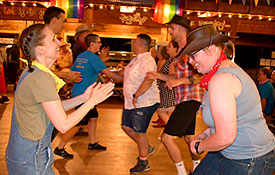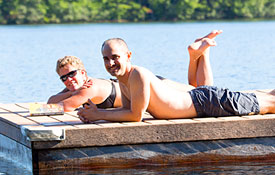‘Camp’Camp brings together more than 200 Campers from across the globe with varying demographics. The Camp community is a friendly, affectionate one (read: germ sharing) as well as a caring and intentional community that works diligently to safeguard its members. This document outlines the proactive protocols we’ve put in place to help ensure a safe and healthy Camp experience when we still live in a time of ever-evolving viruses and risk of contagion.
We’ve appreciated everyone’s understanding and diligence in the years since we’ve been able to gather again in-person after the worst of the COVID pandemic. Our time together is short, and – as we want everyone to be as healthy as possible to enjoy their week in Maine – we ask that everyone joining us at Camp takes the protocols outlined below seriously so that we’re acting together as a community to protect the most vulnerable among us. We should all consider it a natural extension of the respect, support, and encouragement that is the hallmark of ‘Camp’ Camp culture that keeps so many of us coming back year after year.
The protocols outlined here were developed with an eye towards acknowledging that everyone is on vacation for the week and that varying degrees of concern exist within the Camp community around possible infection from COVID, measles, RSV, etc.
As you review the following protocols, please keep in mind the following factors that increase risk for respiratory infection prior to arrival at Camp:
- Fatigue
- Dehydration
- Traveling unmasked
- Not washing hands frequently (hand sanitizer is not a substitute)
- A compromised immune system
- Respiratory or cardiac conditions
- Exposure to ill persons
If you haven’t done so recently, you should consult your primary healthcare provider about current immunizations for COVID, influenza, measles, Pertussis (whooping cough), and RSV. Be aware of your risks, control what you can.
Like all of Camp’s other long-standing rules & regulations, by registering to join us this summer, you are agreeing to abide by these respiratory illness guidelines & protocols, whether or not you agree with them. We feel strongly they are necessary for us all to be able to gather together for a week in as safe a manner as possible.
pre-arrival protocols
- Proof of vaccination will continue to be required for Campers & Staff, as well as our “subcontractors” (i.e., the band for Barn Dance), so everyone on-site will be fully vaccinated.
- We do encourage those of you who have not had the most recent COVID vaccine to arrange to receive that ASAP so your protection is at full efficacy by the time Camp rolls around. It takes 2-3 weeks for the vaccine to build protection, so do your best to schedule this vaccination at the appropriate time. (This is not required to attend Camp, but it is strongly recommended. Minimally, everyone attending Camp must show proof of at least one COVID vaccination when registering, but the most recent update/s to the vaccine are not a requirement.)
- Maine is generally an area of low vaccination rates with tourists from all over, so any additional protection benefits us all.
- Do your best to get all your shopping, errands, etc. for Camp done a week or so before you leave for Camp so that you are minimizing contact with others in the week prior to your departure.
- We don’t expect you to completely isolate or stay home from work, etc., but it’s very important to use wise, best-practices the week prior to your departure to help limit exposure and risk of infection: wear a mask when shopping or in other public indoor venues (even if you don’t normally do so), wash your hands frequently, etc.
- Remember: The healthier you are upon arrival at Camp, the lower your risk will be for contracting or spreading any illnesses.
- Keeping in mind our official masking policies outlined below, bring an adequate supply of face masks for the week, as well as at least two (2) home COVID tests.
- Our on-site Health Center will have some rapid home tests available, but it will help us out greatly if you bring a few tests to Camp with you.
- Take a COVID test prior to leaving home for ‘Camp’ Camp just to ensure you aren’t asymptomatically carrying the virus with you.
- Campers who are at increased risk for illness or who want the highest level of protection should consider bringing N-95 or KN-95 masks. Otherwise, surgical masks are sufficient when covering both the mouth and nose (but not while wearing as a chin strap). They are lighter than many other masks and comfortable for long periods. If you plan to re-use masks, you should hang them in your cabin clean and dry for 48 hours before re-using.
masking policies
- Campers travelling to Maine by air, bus, or train should wear a mask (preferably N-95 or KN-95 masks) when travelling. This is essential towards reducing the risk of widespread infections during Camp. Mask-up on your plane, bus, or train and in crowded airports, bus/train stations, hotel lobbies, etc. Wash your hands frequently. Wipe down frequently touched public areas with disinfectant wipes. Socially distance as much as possible.
- Campers driving to Camp should limit contact and exposure when stopping for gas and bathroom/food breaks during your drive: mask indoors, socially distance as much as possible, get food to go and eat outdoors or in your car, wash your hands.
- Masks are required at all times while in Camp vehicles for the duration of Camp. (Camp Drivers in a vehicle alone with ventilation is the only exception to this policy.)
- Masks are required at all times while in the Health Center for the duration of Camp.
- From arrival until the start of the Barn Dance the evening of the first full day of Camp, masks are required indoors unless actively eating or sleeping. Picnic tables will be tented to facilitate full-group outdoor dining and gathering throughout the week.
- Masks are encouraged indoors at all times throughout the week. We do not “do” mask shaming at Camp! Remember, too, we are masking to protect others, as well as ourselves.
- If instructed by a Staff member to mask up in an activity, Campers may choose to mask or leave the activity.
- Select cabins may be required to mask up outside of the parameters noted above should someone in the cabin test positive for COVID – at least until appropriate testing of all cabin members returns no further infections.
testing & isolation throughout the week
- We strongly recommended that everyone who travels to Camp by air, bus, or train tests for COVID after Rainbow Group on Day 2 (the second morning) of Camp. As Staff arrives earlier than Campers, they may consider testing after Rainbow Group on Day 1.
- Anyone showing signs or symptoms of respiratory illness – i.e., chest discomfort, chills, cough, unusual decrease in appetite, diarrhea, fatigue, fever or feeling feverish, headache, new muscle or body aches, runny or stuffy nose, sneezing, sore throat, vomiting, weakness, wheezing – is required to test, immediately reporting to the Health Center where a Risk Manager or Nurse will assess your signs and symptoms and administer a rapid COVID test.
- Any Staff member not well enough to report for their shift must report to the Health Center prior to the start of their shift for assessment and testing.
- If test results are positive, Campers will need to leave Camp in an effort to reduce the chance of transmission to others. We’ll help you move to an isolation room in the Health Center until you’ve secured off-site accommodations. We’ll then help you get where you need to go.
- Any Camper who is asymptomatic but tests positive will be required to isolate at the Health Center for 24 hours, then will be required to take added precautions for the duration of Camp, including masking, meals outdoors, and social distancing.
- Any Camper with symptoms who tests negative will isolate in the Health Center for a minimum of 24 hours. Once symptoms improve for 24 hours without antipyretics (ibuprofen, aspirin, etc.), Health Center Staff will evaluate them for a return to Camp. A second negative test will clear the return to Camp.
- While isolating at the Health Center, meals will be delivered to your isolation room as you may not enter any community space or participate in any Camp activities.
- Post isolation, Campers may still be required to sleep at the Health Center, depending on the specifics of their situation.
- Cohorting positives is allowed, i.e., multiple Campers who test positive may isolate from the rest of Camp together.
additional best practices for the week
The following behaviors are encouraged to further decrease risk for respiratory infection transmission while at Camp:
- Wash hands frequently and thoroughly
- Carry a water bottle, refilling at the water stations throughout your day
- Keep cabin windows open and ceiling fans (if available) running, as well as running air-conditioners to help filter the air
- Keep your cabin bathroom areas clean and dry, i.e., wipe up after yourself
- Get adequate rest
- Social distancing, i.e., leave a modicum of space between yourself and others, especially early in the week
Hopefully, when everyone abides by the above protocols and acts out of an abundance of caution in the week leading up to Camp, we’ll have a week at ‘Camp’ Camp free of respiratory illnesses! ( outbreaks)
If you’re concerned about illness interrupting your week at ‘Camp’ Camp, we do recommend you secure travel insurance that includes coverage for COVID-related cancellations, quarantine accommodation coverage, etc. Though we have not verified or personally experienced any of the policies noted, BestMoney.com has a list of companies that offer travel insurance that include various COVID-related coverages. (Just check the policy carefully regarding the specifics of what is covered and what is not.)
If you have any questions or concerns about the above, please feel free to e-mail us. Otherwise, we look forward to seeing you in August!






